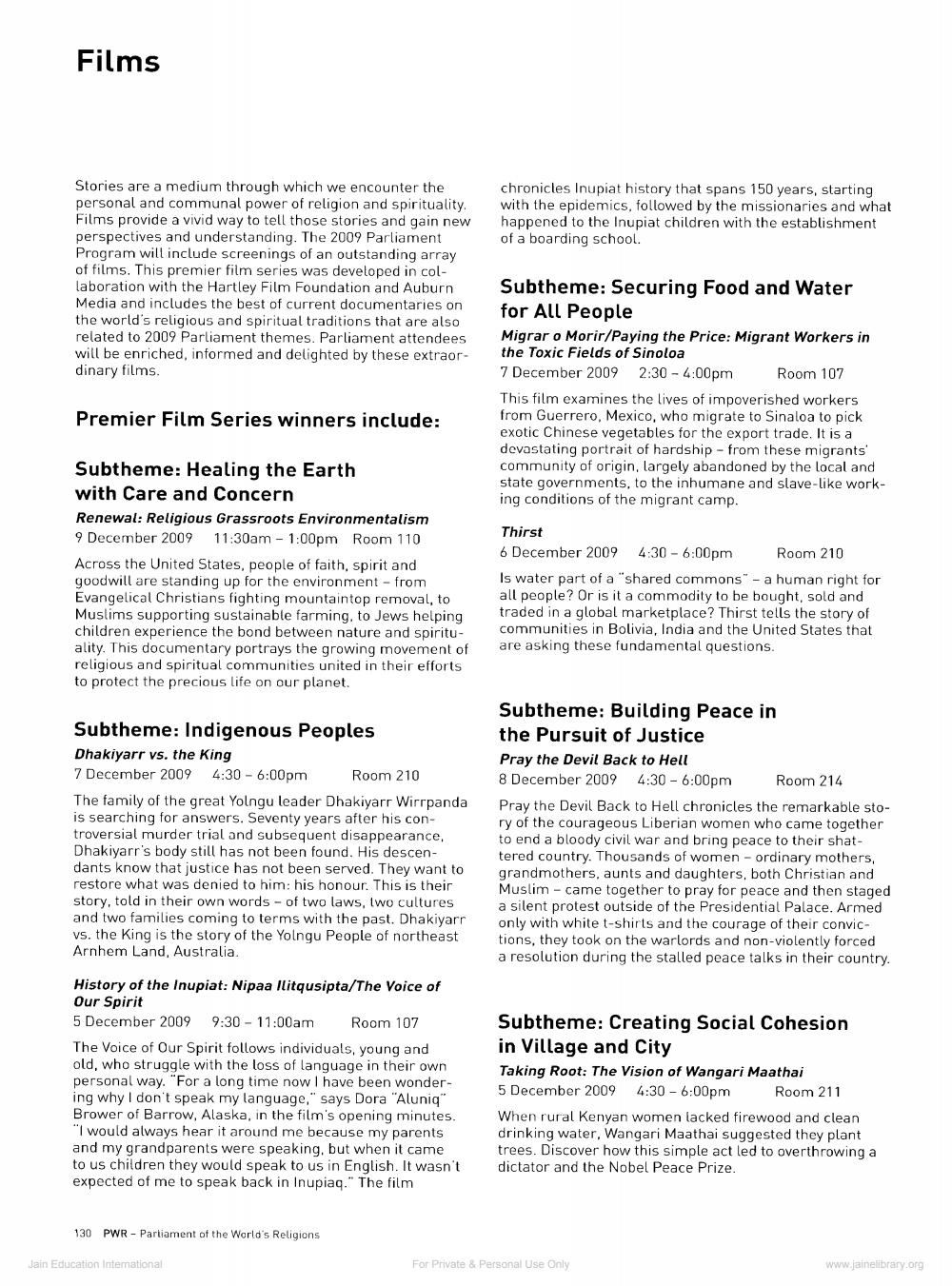________________
Films
chronicles Inupiat history that spans 150 years, starting with the epidemics, followed by the missionaries and what happened to the Inupiat children with the establishment of a boarding school.
Stories are a medium through which we encounter the personal and communal power of religion and spirituality Films provide a vivid way to tell those stories and gain new perspectives and understanding. The 2009 Parliament Program will include screenings of an outstanding array of films. This premier film series was developed in collaboration with the Hartley Film Foundation and Auburn Media and includes the best of current documentaries on the world's religious and spiritual traditions that are also related to 2009 Parliament themes. Parliament attendees will be enriched, informed and delighted by these extraordinary films.
Subtheme: Securing Food and Water for All People Migrar o Morir/Paying the Price: Migrant Workers in the Toxic Fields of Sinoloa 7 December 2009 2:30-4:00pm Room 107 This film examines the lives of impoverished workers from Guerrero, Mexico, who migrate to Sinaloa to pick exotic Chinese vegetables for the export trade. It is a devastating portrait of hardship - from these migrants community of origin, largely abandoned by the local and state governments, to the inhumane and slave-like working conditions of the migrant camp.
Premier Film Series winners include:
Subtheme: Healing the Earth with Care and Concern Renewal: Religious Grassroots Environmentalism 9 December 2009 11:30am - 1:00pm Room 110 Across the United States, people of faith, spirit and goodwill are standing up for the environment - from Evangelical Christians fighting mountaintop removal, to Muslims supporting sustainable farming, to Jews helping children experience the bond between nature and spirituality. This documentary portrays the growing movement of religious and spiritual communities united in their efforts to protect the precious life on our planet.
Thirst 6 December 2009 4:30 - 6:00pm Room 210 Is water part of a "shared commons" - a human right for all people? Or is it a commodity to be bought, sold and traded in a global marketplace? Thirst tells the story of communities in Bolivia, India and the United States that are asking these fundamental questions
Subtheme: Indigenous Peoples Dhakiyarr vs. the King 7 December 2009 4:30 - 6:00pm Room 210 The family of the great Yolngu leader Dhakiyarr Wirrpanda is searching for answers. Seventy years after his controversial murder trial and subsequent disappearance, Dhakiyarr's body still has not been found. His descendants know that justice has not been served. They want to restore what was denied to him: his honour. This is their story, told in their own words - of two laws, two cultures and two families coming to terms with the past. Dhakiyarr vs. the King is the story of the Yolngu People of northeast Arnhem Land, Australia.
Subtheme: Building Peace in the Pursuit of Justice Pray the Devil Back to Hell 8 December 2009 4:30 - 6:00pm Room 214 Pray the Devil Back to Hell chronicles the remarkable story of the courageous Liberian women who came together to end a bloody civil war and bring peace to their shattered country. Thousands of women - ordinary mothers, grandmothers, aunts and daughters, both Christian and Muslim - came together to pray for peace and then staged a silent protest outside of the Presidential Palace. Armed only with white t-shirts and the courage of their convictions, they took on the warlords and non-violently forced a resolution during the stalled peace talks in their country.
History of the Inupiat: Nipaa Ilitqusipta/The Voice of Our Spirit 5 December 2009 9:30 - 11:00am Room 107 The Voice of Our Spirit follows individuals, young and old, who struggle with the loss of language in their own personal way. "For a long time now I have been wondering why I don't speak my language," says Dora "Aluniq Brower of Barrow, Alaska, in the film's opening minutes. "I would always hear it around me because my parents and my grandparents were speaking, but when it came to us children they would speak to us in English. It wasn't expected of me to speak back in Inupiaq." The film
Subtheme: Creating Social Cohesion in Village and City Taking Root: The Vision of Wangari Maathai 5 December 2009 4:30 - 6:00pm Room 211 When rural Kenyan women lacked firewood and clean drinking water, Wangari Maathai suggested they plant trees. Discover how this simple act led to overthrowing a dictator and the Nobel Peace Prize.
130 PWR - Parliament of the World's Religions
Jain Education International
For Private & Personal Use Only
www.jainelibrary.org




